2020 Top 10 CSR Events in China
2021-01-12未知责任编辑0
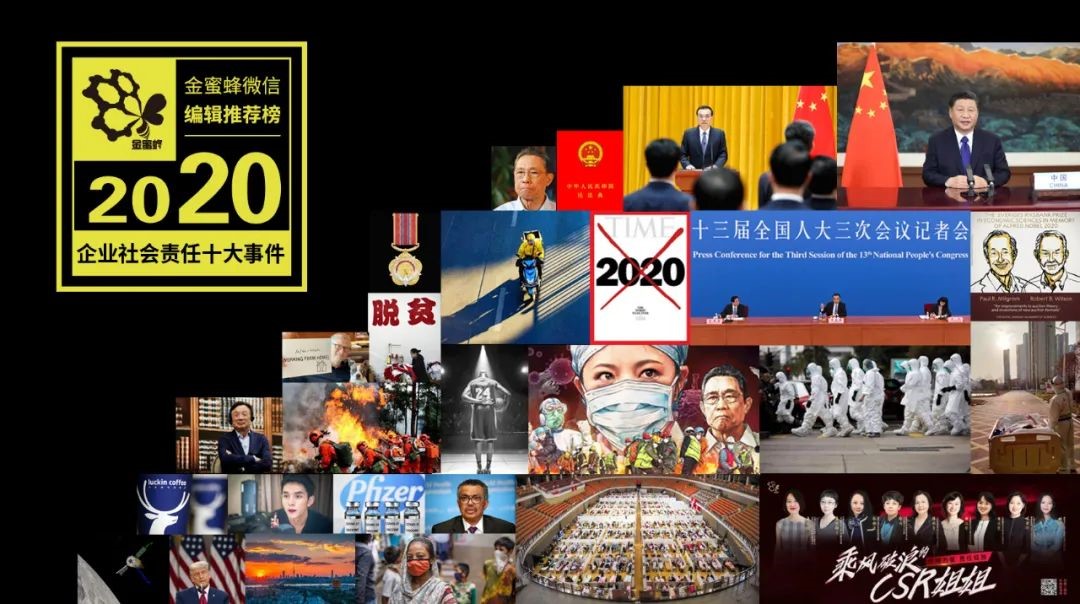
The year 2020 marks the achievement of China’s well-off society in an all-round way. It is also the concluding year of the 13th Five-Year Plan (2016-2020). At the critical moment where the timeframe of the overall strategy of the rejuvenation of the Chinese nation and the profound changes unseen in a century worldwide converge, we have entered an era full of challenges - the global pandemic, complex trading environment, technological development, and business upgrade.
Since 2006, we have been selecting and publishing the annual list of top 10 CSR events for 15 years. As the first step in 2021, China Sustainability Tribune (formerly known as China WTO Tribune) selected the 2020 Top 10 CSR Events in China (in chronological order) to review and solute all efforts in social responsibility development to welcome a better 2021.
Since 2006, we have been selecting and publishing the annual list of top 10 CSR events for 15 years. As the first step in 2021, China Sustainability Tribune (formerly known as China WTO Tribune) selected the 2020 Top 10 CSR Events in China (in chronological order) to review and solute all efforts in social responsibility development to welcome a better 2021.
No. 1 CSCEC builds two emergency hospitals

Two emergency hospitals with the total area of 110,000 square meters were built within 10 days to receive COVID-19 infected patients. The construction of Huoshenshan Hospital was led by China Construction Third Engineering Bureau Co., Ltd. (CCTEB) together with 3 SOEs and 6 sub-branches of CCTEB in Wuhan, and Leishenshan Hospital was constructed by CCTEB, together with 12 subsidiaries of China State Construction Engineering Corporation Ltd. (CSCEC) and 6 sub-branches of CCTEB in Wuhan. At the peak of the massive construction projects, more than 4,000 administrative staff, 35,000 workers and 3,500 construction machines and trucks were on the site. The highly efficient construction of the two hospitals played an important role in the fight against the pandemic, and encouraged the public to win the battle.
Reason for listing:
In 2020, China adopted the most stringent, comprehensive and thorough pandemic prevention and control measures, and made great contributions to the global fight against COVID-19, fully demonstrating the great strength of Chinese people and the Chinese nation. Chinese SOEs, represented by CSCEC, played an important role in coping with the emergency and easing the panic, showing China’s strength and spirit.
Reason for listing:
In 2020, China adopted the most stringent, comprehensive and thorough pandemic prevention and control measures, and made great contributions to the global fight against COVID-19, fully demonstrating the great strength of Chinese people and the Chinese nation. Chinese SOEs, represented by CSCEC, played an important role in coping with the emergency and easing the panic, showing China’s strength and spirit.
No. 2 China’s Civil Code focuses on social responsibility

The Civil Code of the People's Republic of China, as adopted at the 3rd Session of the Thirteenth National People's Congress of the People's Republic of China, was issued on May 28, 2020.
The Civil Code, with equality, voluntary, fairness, honesty, public order, resource conservation and environment protection as important principles, guides civil acts and business operations. It clearly states in Article 86 that for-profit legal persons engaged in business activities should abide by business ethics, maintain transaction safety, accept supervision from the government and society, and assume social responsibility.
Reason for listing:
The Civil Code is the fundamental law for enterprises to engage in economic activities and participate in market competition. Its basic principles and relevant provisions on social responsibility imply that business operators should not just value economic development while neglecting social well-being and life safety, but respect and cherish public interest as the bottom line for the survival and development of enterprises. The spirit of contract should be the cornerstone for enterprises, government, workers, consumers and the public to realize harmonious coexistence and mutual benefit.
No.3 President Xi encourages entrepreneurs to assume social responsibility
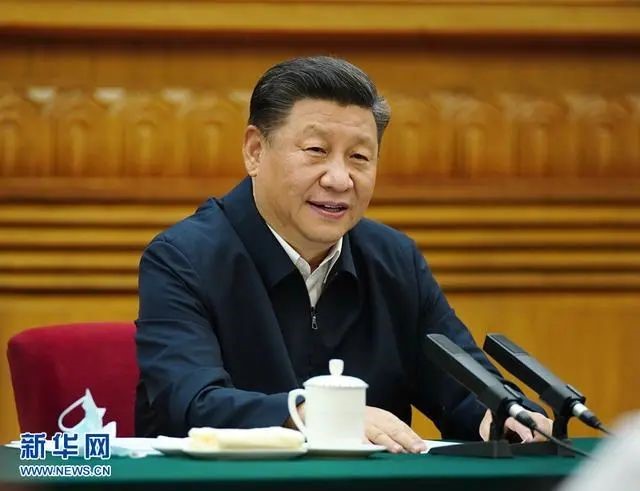
Chinese president Xi Jinping made a speech at the Entrepreneurs' Symposium held in Beijing on July 21, 2020, pointing out that entrepreneurs should improve themselves in patriotism, innovation, integrity, social responsibility and global outlook, to lead enterprises to overcome current difficulties and step into a brighter future. Entrepreneurs could only be recognized by the public when they take social responsibilities and fully give back to the society.
Reason for listing:
In 2020, General Secretary Xi Jinping has publicly called for social responsibility taken by enterprises and entrepreneurs. The state attaches great importance to social responsibility from the top-level design, showing that social responsibility has become one of the guiding ideologies of China's new stage of high-quality development. To strengthen corporate social responsibility and enhance the effectiveness of social governance would become the general trend. As a pioneer in the implementation of the UN SDGs, the commitments and appeals also demonstrate China’s responsibility in building a community with shared future for mankind.
No.4 Takeaway algorithms spark discussion

On September 9, 2020, the official Weibo account of ele.me announced a new function added on its mobile platform to ensure the benefits for the takeaway riders. When customers pay the bill on the APP, they can see a choice of "willing to wait an extra 5 minutes/10 minutes", providing “time-out exemption" benefit for some riders. On the same day, Meituan.com announced that it would give riders 8-minute flexible time to make sure of distribution safety, and the company would further focus on the research of how technology and algorithms can ensure safety. The move made by the two takeaway platforms aims to respond to the longtime exposed conflicts between the algorithmic system of takeaway platforms and the actual work of the riders.
Reason for listing:
As a new economic form emerging with technological development, the contradiction between takeaway algorithms and rider's rights and interests is not only a technical dilemma, but also a social phenomenon widely concerned nowadays. In the process of rapid urbanization in China, takeaway economy has absorbed a large number of employees, and takeaway riders have played an important role in supporting the needs of all walks of life, especially during the pandemic. However, it is clear that there is still a lack of systematic social support behind this new group of flexible workers, and the scope of social responsibility for such platform-based enterprises is not yet clear.
It is worth noting that the positive response and open cooperation attitude adopted by the takeaway platforms is a good start to establish the legal system, infrastructure, social services, knowledge ability and cultural awareness required for this new economic form.
No.5 Central SOEs CSR Management series published

Under the guidance of the Bureau of Sci-Tech Innovation and Social Responsibility of the State-owned Assets Supervision and Administration Commission of the State Council (SASAC), the first three books of the Central SOEs CSR Management series were introduced to the public on September 22, 2020. The books were published by the Economy and Management Publishing House and compiled by enterprises, experts and GoldenBee Consulting.
The three books are: State Grid Corporation of China: Bi-direction driven and Exemplar-geared Social Responsibility Management, China State Construction Engineering Corporation: Brand-geared Social Responsibility Management, China Resources Group: Mission-geared Social Responsibility Management.
Reason for listing:
It is the first time that central SOEs group together to summarize CSR management experience and practices. The series will disclose the CSR management experience of central SOEs to different social sectors. They also serve as an important proof of central SOEs being leaders in China’s CSR management system development.
Publishing the first batch of this series are significant. They not only reveal the determination of China’s first-class enterprises to follow global trends and promote CSR management and sustainable development but also guide more Chinese enterprises to improve their responsible competitiveness and become global leaders in their domain.
No 6. Central SOEs invest nearly RMB 100 billion in poverty alleviation

On October 16, Central SOEs Poverty Alleviation Forum organized by the State-owned Assets Supervision and Administration Commission of the State Council (SASAC) was held in Beijing. According to Ren Hongbin, member of the CPC Committee and Vice Chairman of the SASAC, since 2016, central SOEs have been implementing targeted and effective measures in 246 designated poor counties, accounting for 42% of the all. They have undertaken over 11,000 pairing assistant tasks arranged by local party committees, governments and other relevant departments, investing a total of more than RMB 98 billion.
Meanwhile, central SOEs have summarized their experiences including empowering local industries, driving employment, promoting consumption, focusing on key targets, remedying shortcomings, setting funds and leveraging Party leadership during this process, contributing their own wisdom.
Reason for listing:
Chinese enterprises, represented by central SOEs, have developed unique poverty alleviation model, offering Chinese wisdom and solutions to global poverty reduction and setting benchmark for developing countries. The victory cannot be gained without the efforts of central SOEs, the backbone in fight against poverty.
No.7 International Forum on Corporate Social Responsibility of Industry and Information Technology held at the third CIIE
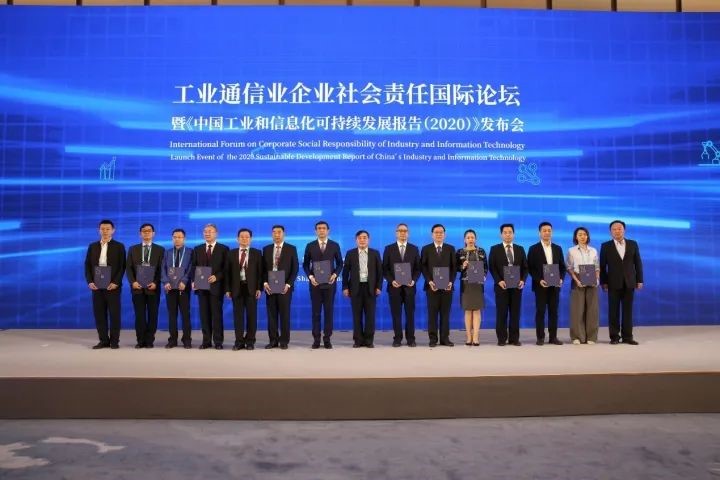
On November 6, as a side event of the third China International Import Expo(CIIE), the International Forum on Corporate Social Responsibility of Industry and Information Technology and Launch Event of Sustainability Report of China's Industry and Information Technology, which was hosted by Ministry of Industry and Information Technology and OECD, was held in Shanghai. At the forum, more than ten national industrial associations and 200 industry and information technology enterprises jointly launched the China’s Industry and Information Technology Corporate Sustainable Development Initiative and discussed “practices and trends: global governance of social responsibility”.
Reason for listing:
This event marks that, for the first time at CIIE, this state-level opening platform, enterprises of industry and information technology industry launched sustainability reports together. It is also for the first time that governments, industrial associations, domestic and foreign companies and international organizations hold corporate social responsibility forum at the CIIE.
This event tells the sustainability stories of China’s industry and information technology enterprises, revealing their global image of “Responsibly Made in China”, with support of industrial innovation and upgrading. It also responses to global concerns on Chinese manufacturing and helps China’s industry and information technology win global trust and support.
No.8 SAMR solicits opinions on the Guidelines for Anti-monopoly in the Field of Platform Economy

On November 10, the State Administration of Market Supervision (SAMR) of China issued the draft of the Guidelines for Anti-monopoly in the Field of Platform Economy, aiming to prevent and stop the monopoly of Internet platforms and promote the sustainable and healthy development of the online economy. The Guidelines defines monopoly agreement as those agreements, decisions (either written or oral), or other concerted actions taken by platform operators to exclude or restrict competition. Practices including “choose one between two” requirements, through which brands are not allowed to be sold on competing platforms, or “using big data analysis to price products to the disadvantage of existing customers” are identified as monopoly.
Reason for listing:
In 2020, anti-trust cases were reported often with some internet platforms receiving warnings from governments. In this background, China’s regulatory authority for the first time issued a guideline targeting internet platforms, marking that anti-monopoly law enforcement on platform economy enters a new stage.
Looking forward, the negative impact of the disorderly capital expansion on economic and social development as well as social values will be curtailed. Platform economy will see more rational behaviors. The Guidelines also enlightens internet platform enterprises that a heathy and orderly digital economy needs not only regulations but also self-restrain. Only win-win results for all stakeholders can internet platforms control risk and benefit sustainable development.
No.9 The first energy central SOEs announces its timelines to reach “carbon emission peak”
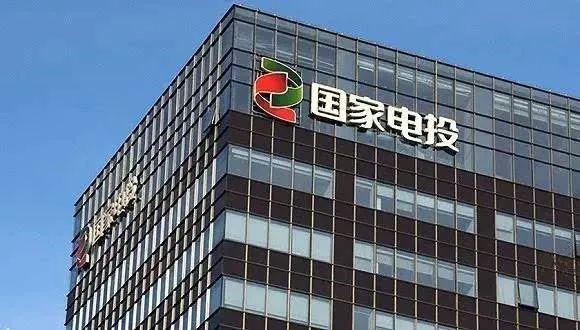
On December 8, Qian Zhimin, Party Secretary and Chairman of China’s State Power Investment Corporation (SPIC) delivered a speech titled The era of green and smart energy brands is on the way at the 2020 China Brand Forum hosted by the People’s Daily. “While formulating our “14th Five-Year Plan” and the “First-Class Strategy 2035”, we made preliminary estimates: SPIC will reach the peak carbon emission in China by 2023 and will contribute to global clean energy and low carbon development”. Mr. Qian said in his speech. While China announced at UN conference that it will aim to achieve a peak in carbon emission by 2030, SPIC will be seven years ahead.
Reason for listing:
The unprecedented crisis caused by the outbreak of COVID-19 pandemic makes the perspective of global sustainable development even more unclear and poses challenges in achieving UNSDGs. In this case, what a business can contribute?
In the fields they excel, Chinese enterprises, represented by SPIC, make firm commitment with a higher standing position and a long-term perspective. Their innovative and cooperative efforts in tackling sustainable development challenges will guide and lead relevant industries, enterprises and organizations, making private sectors play a more effective role in global sustainable development.
No.10 Three new national standards of social responsibility officially implemented in China
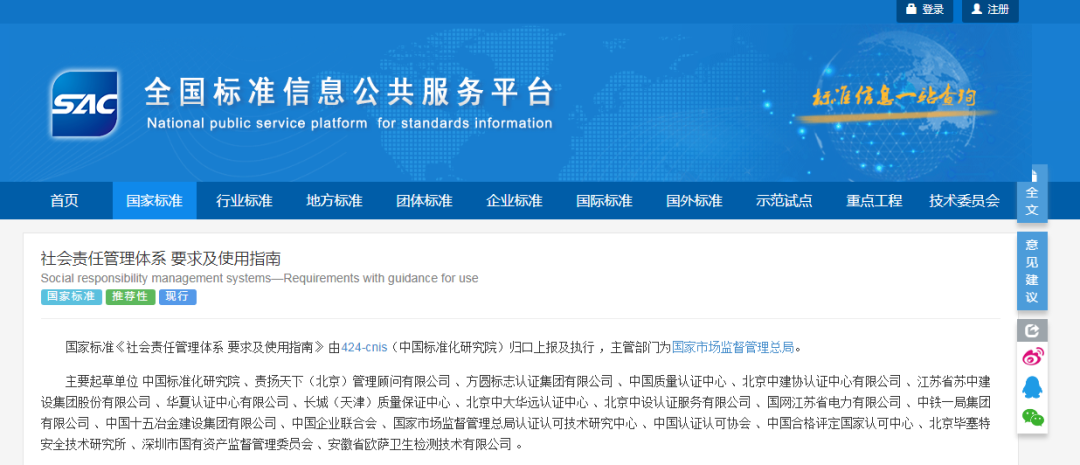
On December 14, 2020, China officially issued and implemented three new national standards of social responsibility, which are GB/T 39604-2020 Social responsibility management systems—Requirements with guidance for use, GB/T 39626-2020 Guidance on the implementation of social responsibility for third party e-commerce trading platform industry and GB/T 39653-2020 Using GB/T 36000 in management systems. GB/T 39604 and GB/T 39653 provide further guidance for organizations to conduct social responsibility management. GB/T 39626 guides e-commerce trading platform industry in applying GB/T 36000 and other basic social responsibility national standards.
Reason for listing:
These three new national standards of social responsibility provide timely and practical guidance for Chinese enterprises that have fully entered the social responsibility management stage. In particular, GB/T 39604 not only promotes the integration of organization management system but also integrate social responsibility into other management system of organizations. Looking forward, the wide application of these standards will help change both the development pattern of social responsibility and the economic growth mode, promoting sound and rapid development of the economy and society.
Experts participating in the selection of the “2020 Top 10 International CSR Events” and putting forward opinions and suggestions include:
- Guo Xiuming, former Associate Counsel, Department of Policies, Laws and Regulations, Ministry of Industry and Information Technology
- Chen Yuanqiao, Researcher of China National Institute of Standardization (CNIS)
- Zhai Qi, Executive Secretary-General, China Business Council for Sustainable Development (CBCSD)
- Cheng Duosheng, Director of Innovation Working Department of Chinese Enterprises Federation
- Han Bin, Executive Secretary-general of UN Global Compact Network China
- Liang Xiaohui, Chief Researcher of Social Responsibility Office, China National Textile and Apparel Council
- Zhang Shaoping, Executive Director, China Association of Social Workers, Committee of Corporate Citizenship
- Lei Hong, Vice Chairman of Chinese Sociological Association, Professor of School of Sociology, Huazhong University of Science and Technology (HUST), and Dean of HUST-GoldenBee CSR Research Institute
- Qian Xiaojun, Vice Dean of Schwarzman College, Tsinghua University; Director of Green Economy and Sustainable Development Research Center
- Yin Gefei, Chief Expert of GoldenBee Thinktank; Secretary of ISO 26000 Stakeholder Global Network (SGN)
- Yang Dongning, Associate Professor of Guanghua School of Management, Peking University; Deputy Director of Center for Responsibility and Social Value
- Cui Shengxiang, Professor, China University of Labor Relations
- Xue Dayuan, Professor of Minzu University of China
- Li Li, Associate Research Fellow of Institute of International Economy, University of International Business and Economics (UIBE)
- Guo Yi, Professor of School of Economics, Beijing Technology and Business University (BTBU), and Director of Business Environment Research Center, BTBU
- Zhou Weizhong, Professor of Business School, Central University of Finance and Economics
- Guan Zhusun, Executive Dean of Huazhong University of Science and Technology-GoldenBee CSR Research Institute
- Yu Zhihong, President and Editor-in-Chief of China Sustainability Tribune
- Chen Yuanqiao, Researcher of China National Institute of Standardization (CNIS)
- Zhai Qi, Executive Secretary-General, China Business Council for Sustainable Development (CBCSD)
- Cheng Duosheng, Director of Innovation Working Department of Chinese Enterprises Federation
- Han Bin, Executive Secretary-general of UN Global Compact Network China
- Liang Xiaohui, Chief Researcher of Social Responsibility Office, China National Textile and Apparel Council
- Zhang Shaoping, Executive Director, China Association of Social Workers, Committee of Corporate Citizenship
- Lei Hong, Vice Chairman of Chinese Sociological Association, Professor of School of Sociology, Huazhong University of Science and Technology (HUST), and Dean of HUST-GoldenBee CSR Research Institute
- Qian Xiaojun, Vice Dean of Schwarzman College, Tsinghua University; Director of Green Economy and Sustainable Development Research Center
- Yin Gefei, Chief Expert of GoldenBee Thinktank; Secretary of ISO 26000 Stakeholder Global Network (SGN)
- Yang Dongning, Associate Professor of Guanghua School of Management, Peking University; Deputy Director of Center for Responsibility and Social Value
- Cui Shengxiang, Professor, China University of Labor Relations
- Xue Dayuan, Professor of Minzu University of China
- Li Li, Associate Research Fellow of Institute of International Economy, University of International Business and Economics (UIBE)
- Guo Yi, Professor of School of Economics, Beijing Technology and Business University (BTBU), and Director of Business Environment Research Center, BTBU
- Zhou Weizhong, Professor of Business School, Central University of Finance and Economics
- Guan Zhusun, Executive Dean of Huazhong University of Science and Technology-GoldenBee CSR Research Institute
- Yu Zhihong, President and Editor-in-Chief of China Sustainability Tribune
Best Practices
- The 100-year brand — Air Liquide also has a sense of juvenile
- Beijing Public Transportation Corporation: Developing green transportation to build a harmonious and livable capital
- CGN: Building a modern factory in barren deserts and developing a new win-win cooperation model along “Belt and Road”
Upcoming Event

All the materials on the site “Source: XXX (not from this site)” have been reprinted from other media. They do not imply the agreement by the site.
All the materials with “Source: CSR-China Website” are the copyright of CSR-China Website. None of them may be used in any form or by any means without permission from CSR-China Website.
GoldenBee Official WeChat
Copyright © Csr-china.net All Right Reserved.
京ICP备19010813号










